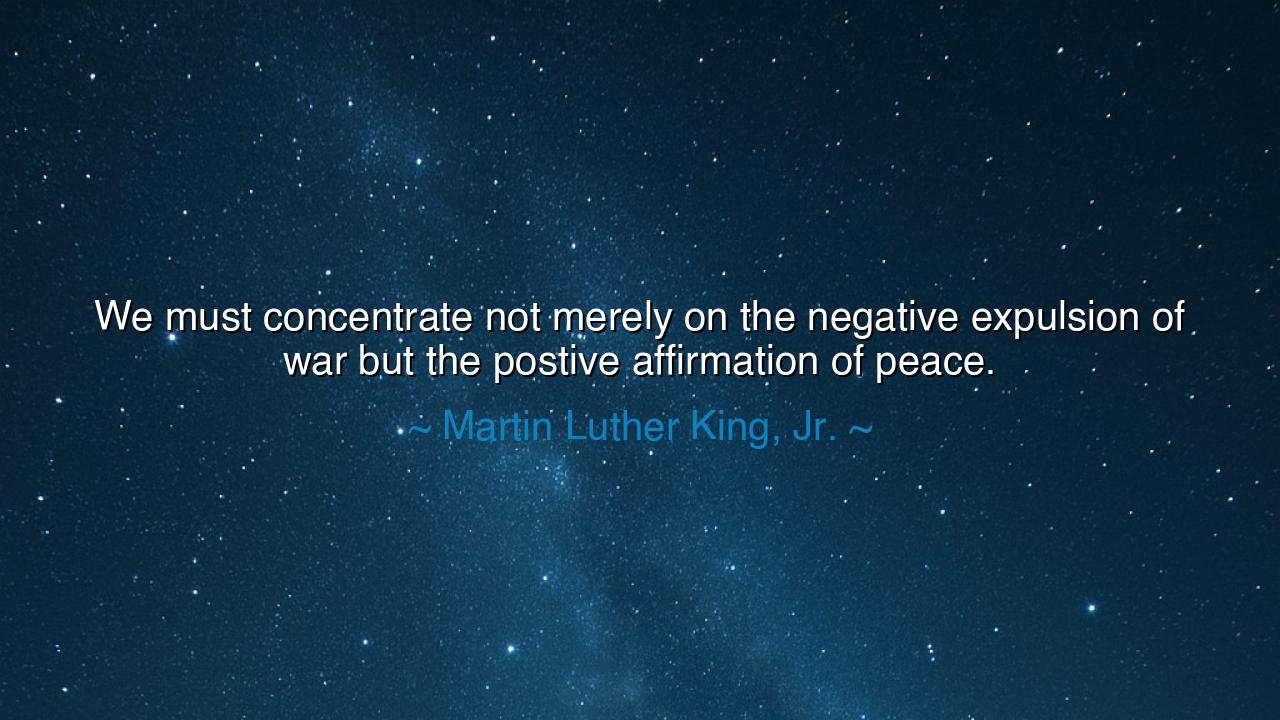
We must concentrate not merely on the negative expulsion of war
We must concentrate not merely on the negative expulsion of war but the postive affirmation of peace.






Hear the words of Martin Luther King, Jr., prophet of justice and dreamer of a world reborn: “We must concentrate not merely on the negative expulsion of war but the positive affirmation of peace.” These words ring like a bell across the valleys of time, calling us not only to reject destruction but to embrace creation. For to drive away war without building peace is to leave the house empty, waiting for darkness to return. The lesson here is eternal: absence is not enough; only presence gives life.
Too often, men believe that to end war is victory enough. They lay down their weapons, yet keep their hatred. They silence the guns, yet leave hearts unhealed. Such peace is an illusion, a pause between storms. True harmony is not the hollow silence after battle; it is the affirmation of peace, the daily choosing of compassion, justice, and unity. Without this, the soil remains poisoned, and new wars sprout like weeds.
Consider the example of Japan after World War II. The flames of war had consumed its cities, leaving Hiroshima and Nagasaki as shadows of despair. Yet the nation did not remain in bitterness or destruction. Through deliberate effort, they rebuilt—not only their buildings but their spirit. They embraced the way of peace, fostering art, technology, and cooperation. Their transformation became a living testament to King’s words: the expulsion of war is incomplete until it is crowned by the affirmation of peace.
King spoke from the battlefield of the human spirit, where he led his people through the struggle for civil rights. He knew that to tear down the walls of segregation was not enough; the greater work was to build the bridges of love. For what good is freedom if it does not give rise to fellowship? What good is justice if it does not birth brotherhood? This is why he demanded not only the end of oppression but the birth of a beloved community, where peace was more than silence—it was presence, power, and promise.
O children of tomorrow, learn this well: destruction is easy, but creation is holy. Anyone can cry for the end of war; only the brave labor for the fullness of peace. To affirm peace is to act with intention—to choose forgiveness when vengeance beckons, to speak kindness when hatred tempts, to labor for justice when indifference lulls. It is not enough to say, “I will not harm.” One must also say, “I will heal. I will build. I will love.”
Think of your own life: how often do you pride yourself in avoiding conflict, yet fail to actively sow peace? To remain silent while others are wounded is not to affirm peace but to watch quietly as harm continues. King’s wisdom commands us to move beyond passivity into action—to lift the fallen, to reconcile the estranged, to shine light where shadows dwell.
The lesson is clear: war is not only fought with swords but with hatred, division, and fear. To banish these is good, but it is not enough. You must fill the void with the positive fire of peace. Begin in your homes: affirm peace with your loved ones through patience and presence. Continue in your communities: affirm peace by working for justice where wrongs persist. Extend it to the world: affirm peace by rejecting hatred and sowing unity across borders.
So let these words remain as sacred guidance: “Not merely the negative expulsion of war, but the positive affirmation of peace.” Let your life be more than resistance—let it be creation. Let your days be more than silence—let them resound with acts of love. And let your legacy be this: that you did not only cast out the darkness, but that you kindled the light.






AAdministratorAdministrator
Welcome, honored guests. Please leave a comment, we will respond soon